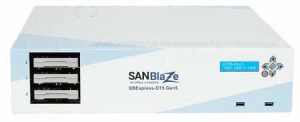SANBlaze OCP Testing and Major Updates to NVMe Test Suite
Including OCP 1.0a scripts and Low Power Sub-States validation in V10.5
This is a Press Release edited by StorageNewsletter.com on April 19, 2023 at 2:01 pmSANBlaze Technology Inc. released enhancements to its NVMe qualification platform.
SBexpress Dt5 PCIe NVMe SSD test system
Certified by SANBlaze test suite update, available via versions 10.5 and 10.5.1, supports all aspects of NVMe qualification with the addition of Open Compute Project (OCP) 1.0a and Low Power Sub-states validation. Capabilities also include PCIe Single Root I/O Virtualization (SR-IOV), ZNS, VDM, TCG, SRIS/SRNS clocking, OPAL, and T10/DIF. A variety of updates for APIs and Linux are included.
Open Compute Project (OCP) 1.0a support
The OCP was formed to quicken innovation for open source hardware solutions in hyper-scale data center environments. It requires that SSDs adhere to the OCP’s NVMe Cloud SSD Specification v1.0 or the newer Datacenter NVMe SSD spec v2.0.
The company provides built-in software for testing an OCP drive, which must be tested to a minimum standard above and beyond the standard mandatory NVMe features, as well as specifying minimum reliability, thermal, endurance, management, and form factor requirements. OCP specs may be found at this website.
Low power sub-states validation
SBExpress and the Certified by SANBlaze test methodology have simplified qualification of PCIe NVMe devices by providing a simple means of creating complex test suites, validating spec compliance, data integrity, power and reset testing, MI compliance, and now, low power sub-states.
With version 10.5 of the Certified by SANBlaze test suite, the company has introduced a suite of tests designed to verify the operation of NVMe devices in the low power sub-states L1.1 and L1.2.
“L1.x sub-state testing presents a unique but crucial challenge for producers of NVMe devices destined for use in battery powered devices such as tablets and laptops,” said Vince Asbridge, CEO and director engineering. “These devices will greatly benefit from the new power sub-states which trade a little PCIe latency for the lowest possible power consumption.”
The fundamental difference, with respect to L1.x sub-states, is the use of an out-of-band signal to indicate to the device to ‘wake back up’. The use of an out-of-band signal allows the device to achieve a near zero power consumption state by powering down its transceivers completely and monitoring only the level of the CLKREQ# out-of-band signal.
Broad range of updates
Following features are highlighted in release:
- OCP 1.0a Validation Testing
- Automated low power sub-state support for client-based power testing
- ASPM
- LTSSM
- PS1, PS2, PS3, PS4
- PLN/PLA support for M.2 adapters
- Dual-port test cases added to SBCert
- NVMe-oF spec updates
Other features include:
- SR-IOV (Single Root I/O Virtualization)
- Python API for integration into existing test infrastructure
- MI in-band testing
- MI/VDM error injection (manipulation of the PCIe VDM header)
- Linux distribution upgrade for IT security
- Ability to specify an interpacket delay in multi-packet MI request commands
- TCP/IP NVMe fabric up to 200G
- Discovery information registration and discovery information de-registration for centralized discovery for IP-based Fabrics
- SGL error injection
- T10 DIF error injection
- Script editor capability from the GUI
“Certified by SANBlaze, the most robust test suite now being recognized and adopted by major SSD manufacturers and system OEMs, has become even more valuable with the addition of OCP 1.0a and low power sub-state testing,” said Rick Walsh, VP, sales and marketing. “With low-power sub-state client SSD testing used in tablets and laptops, and the latest OCP 1.0a test and validation scripts, we continue to offer a robust certification test suite that the storage market relies upon.”
To download the new software visit the website.
















 Subscribe to our free daily newsletter
Subscribe to our free daily newsletter


